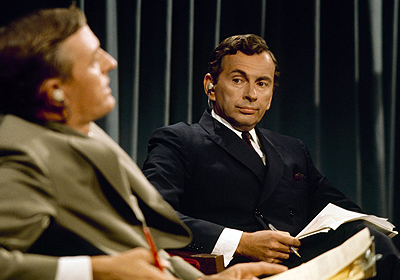
"a truly brilliant documentary, providing a fascinating look at a pivotal moment in American political and television history, seen through the eyes of two men with clashing intellects and titanic egos"
Political debate is an important factor in the maintaining of a healthy democracy. In the UK we have our programmes like Question Time in which pundits debate their respective positions in a manner that, while sometimes heated, is more often than not cordial in their manner. Over in the United States, it’s an entirely different situation. These are hardly debates and are more akin to screaming matches in which pundits attempt to shout each other down instead of engaging in meaningful discussion. The documentary Best of Enemies allows us to see how this format that was brought to American television in the 1960s. Exploring that, although pioneering for the time, would ultimately lead to the creation of the present problem that continues to blight televised political debate over there.
The film details how, in a way to increase its falling ratings, TV network ABC invited two of America’s most respected intellectuals to ten televised debates in the run up to the 1968 Presidential election. Representing the right wing was political commentator and writer William F. Buckley. His opponent representing the left wing was author and playwright Gore Vidal. Both men were polar opposites, divided on all matters, on politics and the Vietnam War to name but a few. The often fierce debates laid bare the deep divisions facing the United States at that time and would ultimately create the environment in which present political debate is conducted on American television screens.
The film is brilliant in its execution. From the way that it presents its key figures, with Vidal and Buckley both profiled in detail in a mix of archive footage and readings of personal writings, this allows the viewer a means to understand the mindsets of the two men, and reveals that despite their many differences; the two are mirror images of each other. The film also provides a look into the context in which these debates took place. Blighted by political assassinations, frequent violent protests over the Vietnam War and growing anger about the increasing social inequality between the classes, 1968 was a troublesome year in the United States and the divide facing the country was personified by Buckley and Vidal.
The film is punctuated with interviews from various journalists, historians and commentators who discuss the debates, their impact and why Vidal and Buckley were so revered by their followers and the influence they had over social movement. These interview segments allow the viewer to gain a deeper insight into the importance of the Vidal/Buckley debates and what they would ultimately hold for the future of political discussion on American television.
However the highlight of the film are the debates themselves, which the film brilliantly presents as being like rounds in an intellectual prize fight, with the two trading insults back and forth, making no secret of their hatred towards one and other.
The debates are fierce and often personal. Vidal often accused Buckley of being wishful of the US to adopt an imperialistic attitude and of being no better than a fascist. Buckley attacked Vidal as a prime example of what he perceived as a moral decline in society, drawing attention to Vidal’s novels which often dealt with, for the time, controversial topics such as homosexuality. The hostility truly comes to the forefront in one notable instance in which Buckley threatens Vidal with physical violence, calling Vidal ‘a queer’ as he does so, following accusations of being a ‘crypto-Nazi. The viciousness in which the two attack each other is fascinating to watch, and the use of the actual footage recorded at the time captures this better than any reconstruction ever could.
I found myself rooting for Vidal who, despite being somewhat pompous and arrogant in his attitude, spoke of helping the poorest in society with a greater focus on social issues rather than continuing the Vietnam War, which made him appear more sympathetic. Buckley on the other hand while presenting a much more charming demeanour struck me as somewhat sinister, communicating his extreme conservative and often pro-war viewpoints with an unsettling smile reminiscent of the Cheshire cat.
Best of Enemies is a truly brilliant documentary, providing a fascinating look at a pivotal moment in American political and television history, seen through the eyes of two men with clashing intellects and titanic egos. The masterful combination of the actual debates themselves, with contributions from interviews and readings, allows for an engrossing watch that educates the viewer in a fast-paced format that never becomes dull or feels like a lecture. It shows us how important and fierce political discussion can be and given the debates that are sure to arise as 2016 Presidential race heats up, the film could not have come at a more important time.


No Comment